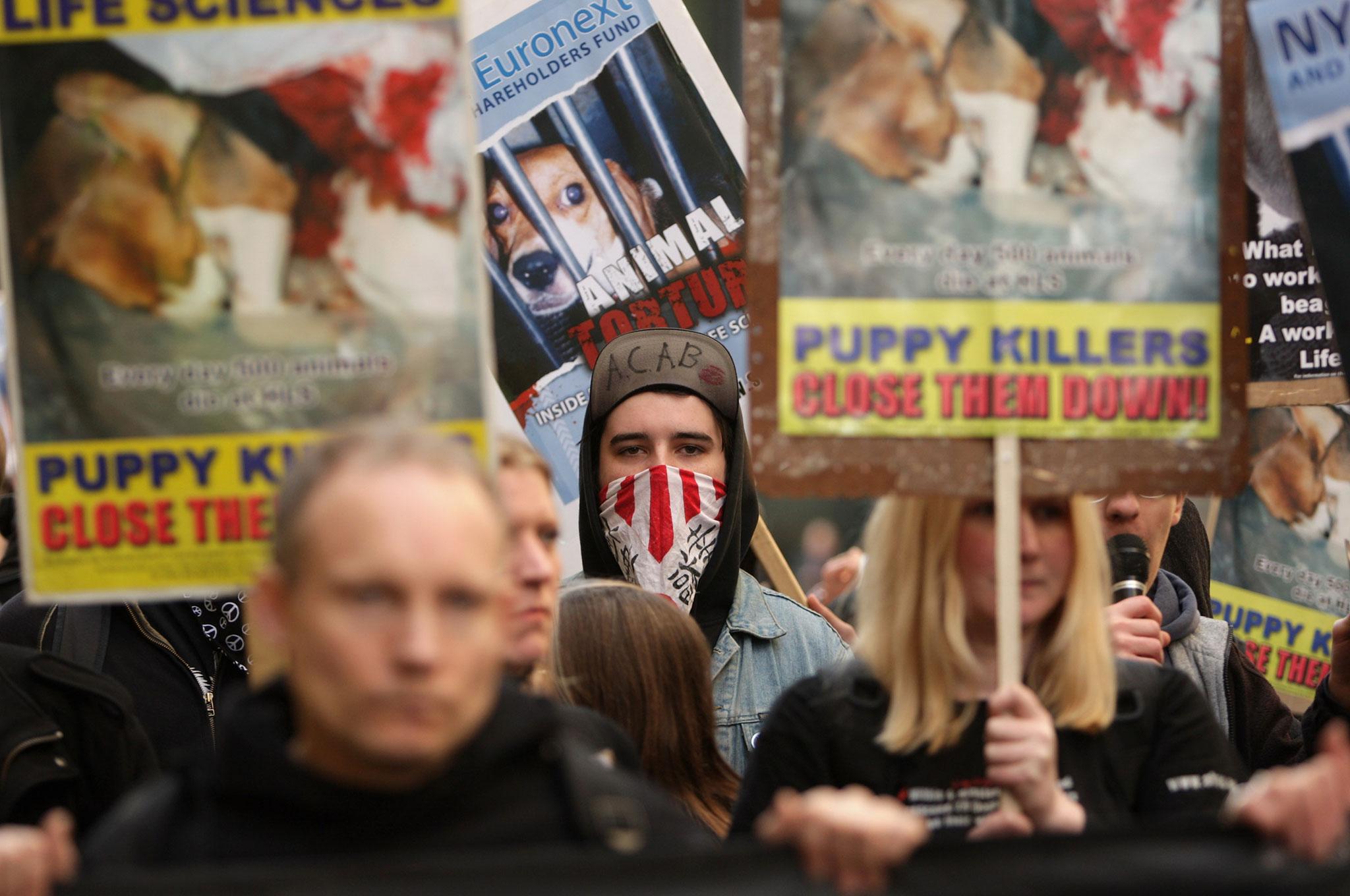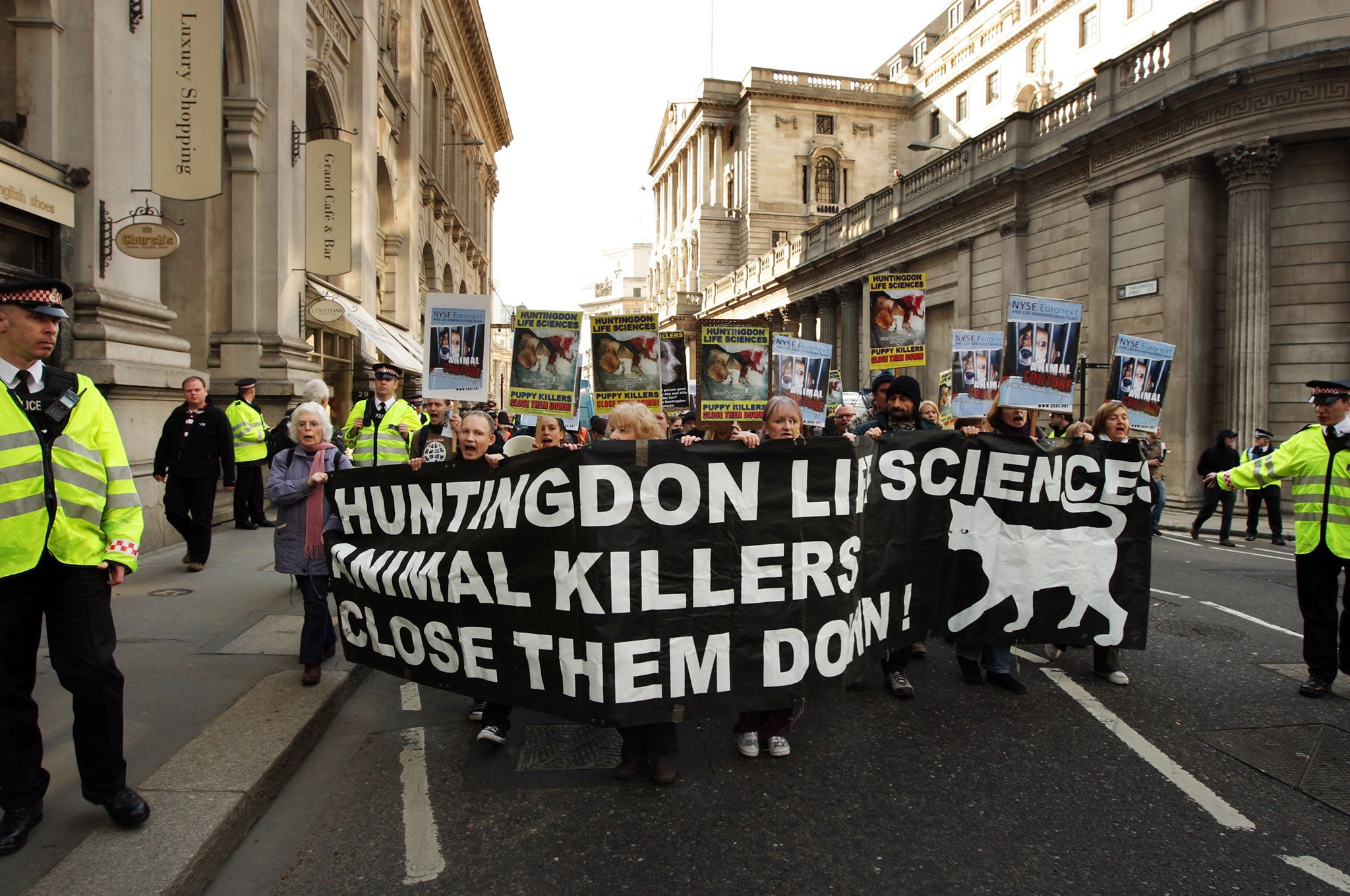Animal rights group ends 15-year campaign against experiments at Huntingdon
Activists have changed their tactics due to an 'onslaught of government repression'

Animal rights leaders have ended their high-profile campaign against a testing centre after 15 years of intimidation and direct action that broke new ground with the sophisticated targeting of the centre's City backers.
The campaign led to the jailing of dozens of activists and a change in the law to counter the guerrilla tactics of the group that targeted financial institutions, suppliers, contractors and directors of the Huntingdon Life Sciences (HLS) testing centre in Cambridgeshire.
Stop Huntingdon Animal Cruelty (Shac) and its supporters embarked on what one judge called a "ruthless, sustained campaign" making false allegations of child abuse, sending hoax bombs and delivering sanitary towels allegedly contaminated with the Aids virus to try to traumatise staff.
But new laws and a police crackdown on the organisation have led to protests running at a low level for years, prompting Shac to announce the end of its campaign, due to what it called the "onslaught of government repression" against the animal rights movement.
During the campaign, the leaders targeted more than 40 companies to try to force them to sever their links with HLS. Brian Cass, HLS managing director, was attacked outside his home with a pickaxe handle. Supporters torched employees' cars and claimed to have sunk the boat of an executive from an American bank that was supporting HLS.

The company survived – but only after losing a series of financial backers and temporarily re-listing in the United States to protect the identities of its investors before a change in the law in Britain. The government – which faced accusations of failing to protect the bioscience industry – spent more than £1m on protection for the testing centre.
Legislation, a string of injunctions and a pan-European police operation that led to the arrests of 32 people in 2007 effectively broke the back of the movement and led to the jailing of its leadership. Six members of the US branch of Shac were also jailed in 2006.
Legal action is continuing against anti-HLS protesters with the last major figure of the movement, Debbie Vincent, jailed for six years earlier this year for blackmail. In a statement on the Shac website under the heading: "We made history … the future is ours", the group said it had run the "biggest and most effective grassroots animal rights campaign the world has ever seen".
"After more than 10 years of organising the SHAC campaign and having sent shockwaves throughout the entire vivisection industry, our opposition has evolved. The global animal abuse and legal landscapes have changed and so it's time for us too, to change our tactics. With the onslaught of government repression against animal rights activists in the UK, it's time to reassess our methods, obstacles and opponent's weaknesses, to build up our solidarity network for activists and to start healing the affects [sic] of repression."
The leaders, Gregg Avery, his wife, Natasha, and his former wife, Heather Nicholson, were jailed in 2009 for their role in the protests. They targeted firms and staff in Britain, France, Germany, Sweden and Switzerland and the cost of damage and security ran to £12.6m, their trial was told.
Mr Avery started the campaign against HLS in 1999 after becoming involved in a series of actions, freeing cats and beagles from breeding centres. He told one interviewer there was a hard core of about 10 campaigners but that HLS was "in the middle of nowhere", so it was most effective to hit the company financially. He denied Shac was involved in violent acts and blamed the Animal Liberation Front (ALF) – which had shared supporters – for the most extreme acts. ALF spokesman Robin Webb said that Shac took "secondary picketing" tactics from the union movement. "Other environmental campaigners have taken a lot from Shac's example over the years," he said. "They kept animal rights in the public eye."
HLS – which made a marginal profit on turnover of £73m in its last published figures in 2012 – conducted animal testing for the pharmaceutical and chemical industries. In a statement, the company said: "The decision by Shac to end the campaign is welcomed by Huntingdon Life Sciences and all those associated with the company. "Even during the early years when extremism was at its height HLS still managed to successfully grow its research business. The UK environment for the use of animals in biomedical research has improved greatly in recent years, and this is the result of action taken by law enforcement agencies to control animal rights extremism."
A Shac activist said the group was now seeking to influence the Government into changing the law to prevent animal cruelty.
